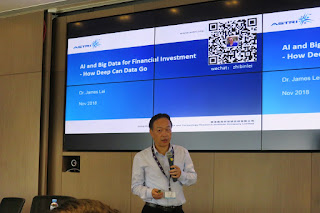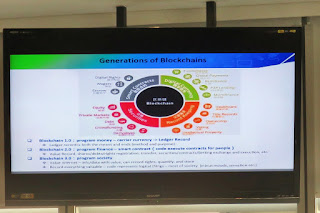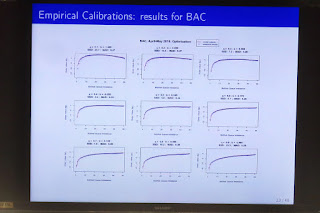The 1st
Workshop on Financial Data Analysis was co-organized by Hong Kong Institute for
Data Science (HKIDS) and School of Data Science, CityU held on 14th
Nov 2018. The workshop aimed to bring
together a unique group of active researchers from academia and industry to
share with each other the latest research on the fusion of data science and
finance. All participants had a group photo for memory.
Before the
workshop, I have took a photo with Prof. Duan Li (Acting Dean and Chair
Professor of Operations Research, School of Data Science).
I met Dr. Inez
M. Zwetsloot (Assistant Professor, SEEM) and we had attended ANQ Congress 2017
in Nepal together.
I also took a
photo with Dr. Wen Zhang (張雯) (Senior Manager,
Vector Lab, Risk Management Department, JD Finance (京東金融)) for memory.
In the
beginning, Prof. Duan Li gave welcome address. He briefed the aim of the
workshop and introduced School of Data Science.
The first
speaker was Prof. Tony He (University of Technology Sydney) and his topic
entitled “Information Diffusion and Speed Competition”. He briefed the Publicly
available information for Trader and Firm.
Fast Information and Fast Trading as well as information diffusion and speed competition affecting market quality were discussed.
His key ideas
included that informed traders’ trading intensity was a substitute to slow
informed traders’ trading intensity but a complement to fast traders’ trading
intensity. With speed hierarchies, there
was the significant crowding-out effect, however market quality is improved.
Finally, Prof.
Li introduced the Trading Intensity Interaction model as following diagram.
The second
speaker was Dr. Wen Zhang (JD Finance) and her presentation named “Data-Driven
Asset Management of Defaultable Products in Consumer Lending”. Firstly, Dr. Zhang introduce JD Finance which
was a technology company serviced financial organizations. Her talk included the consumption finance in
internet and personal credit management as well as credit risk management.
Internet
finance had very large scale and different financial products. They were belong to Consumption Finance
Platform with four key elements included attracting customer capability,
customer experience, risk control and capital cost.
Then Dr. Zhang
briefed the personal lending credit and after lending management. After lending management had static
monitoring and dynamic monitoring.
Dr. Zhang and
then briefed dynamic monitoring considered the consumer’s SMS, IVR, Salary and
asset, etc.
Lastly, She
mentioned different solutions for risk calculation and management that employed
AI neural network included Federal Transfer Learning that could solve the
personal data security problem.
Prof. Nozer D.
Singpurwalla (CityU) was the third speaker and his topic was “Updating Personal
Probabilities (The Essence of Data Science?)”.
Prof. Nozer said a key tool underlying data science, be it machine
learning, deep learning, pattern recognition, or AI is Bayes’ Law.
“Bayes’
Theorem plays a central role in Pattern Recognition and Machine Learning.” Said
by Prof. Nozer and then he explained the Bayesian Probability and Bayesian
Statistics.
Then he
briefed the Bayesian Conditionalization that also known as Confirmation Tenacity
and also to be Mechanical Updating.
However, Bayes’
Law was not able to apply when a surprise event occur (e.g. New York on 911).
Dr. James Lei
(ASTRI) was the fourth speaker and his presentation entitled “AI and Big Data
for Financial Investment”. Firstly, Dr. Lei introduced ASTRI technologies
divisions and core competence groups.
Then Dr. Lei briefed
the different between Traditional IT and FinTech that Traditional IT served the
financial industry but FinTech redefined the boundary between quantitative
science and ICT that was cross-layer innovation.
After that he
mentioned that separated computation model and infrastructure model. The infrastructure model between Central and Distributed.
Lastly, he
described the different generations of blockchains from 1.0 to 3.0.
Prof. Xuefeng
Gao (CUHK) was the fifth speaker and his topic named “Stochastic Modeling for
Limit Order Valuation”. Prof. Gao discussed market simulator and findings as
well as empirical calibration and validation.
He said that
major financial markets were now electronic and exchanges provided a limit
order book to maintain the collection of bids and offer and a matching engine
to match buyers and sellers and execute trades. He introduced the estimation of
the transition matrix P of microprice using frequency of transitions and then
showed the calibration results for BAC.
At the end, Prof.
Gao introduced Multi-Armed Bandit (MAB) Algorithms which balance exploration
and exploitation. Generally favor the
most promising arm/option but with some amount of exploration. He concluded to develop a stochastic model
for predicting the expected profit of limit order at best quote for large-tick
assets.
Afternoon Session
The sixth
speaker was Dr. Qi Li (Hong Kong Monetary Authority) and his presentation topic
entitled “Model Risks of Advanced Data Analytics’ Application in Finance”. Dr. Li said AI and Machine Learning were
rapidly adopted for applications in financial industry. However, the validation was important.
Then Dr. Li
pointed out some challenges in Model Risk Management of AI/ML such as Data,
Methodology, Processes and Governance.
Finally, he
had some questions of model validation for AI/ML models included Q1 about
efficient validation; Q2 Biased in Prediction and Q3 Confirmation Bias.
The seventh
speaker was Dr. Qi Wu (CityU) and his presentation named “Parsimonious Learning
of Financial Asset Tail Dynamics”. Firstly, Dr. Wu briefed some background such
as setting bank capital requirement – Basel Committee on Bank Supervision (BCBS,
2016).
Then he
introduced his research question about conditional quantiles exhibit different
lengths of memory at different levels of probabilities.
Lastly, he
discussed his model named Long short-term memory (LSTM) - HTQF and its advantages.
Prof. Yanchu Liu (Sun Yat-sen University) was the eight speaker and his topic was “Textual Sentiment, Option Implied Information and Equity Return Predictability”. In the beginning, Prof. Liu briefed some literatures about Sentiment and options markets.
After that Prof.
Liu mentioned some findings included predict single-stock option market
variables both firm-specific sentiment and aggregate sentiment; and Aggregate
negative sentiment was a strong predictor.
He said option market variables where sentiment was partialled out
remain significant predictors.
Lastly, he
told us his study data from Nasdaq articles from 2012-2015.
The last
speaker was Dr. Gilbert Wang (China CR Capital Holdings Limited) and his
presentation named “High-Frequency Trading and Cross-border Arbitrage Trading
Strategies”.
Firstly, Dr.
Wang briefed the Algorithm Trading that was automated orders and no human
intervention with high speed execution that only relied on data.
High Frequency
Trading (HFT) occupied significant shares in US and Europe market with
extremely low latency (said micro second).
At the end, Dr. Wang showed the Risk Management Framework using Data Science to assist HFT and reducing risk.
Reference:
CityU School of Data Science - https://www.cityu.edu.hk/sdsc/





































沒有留言:
發佈留言